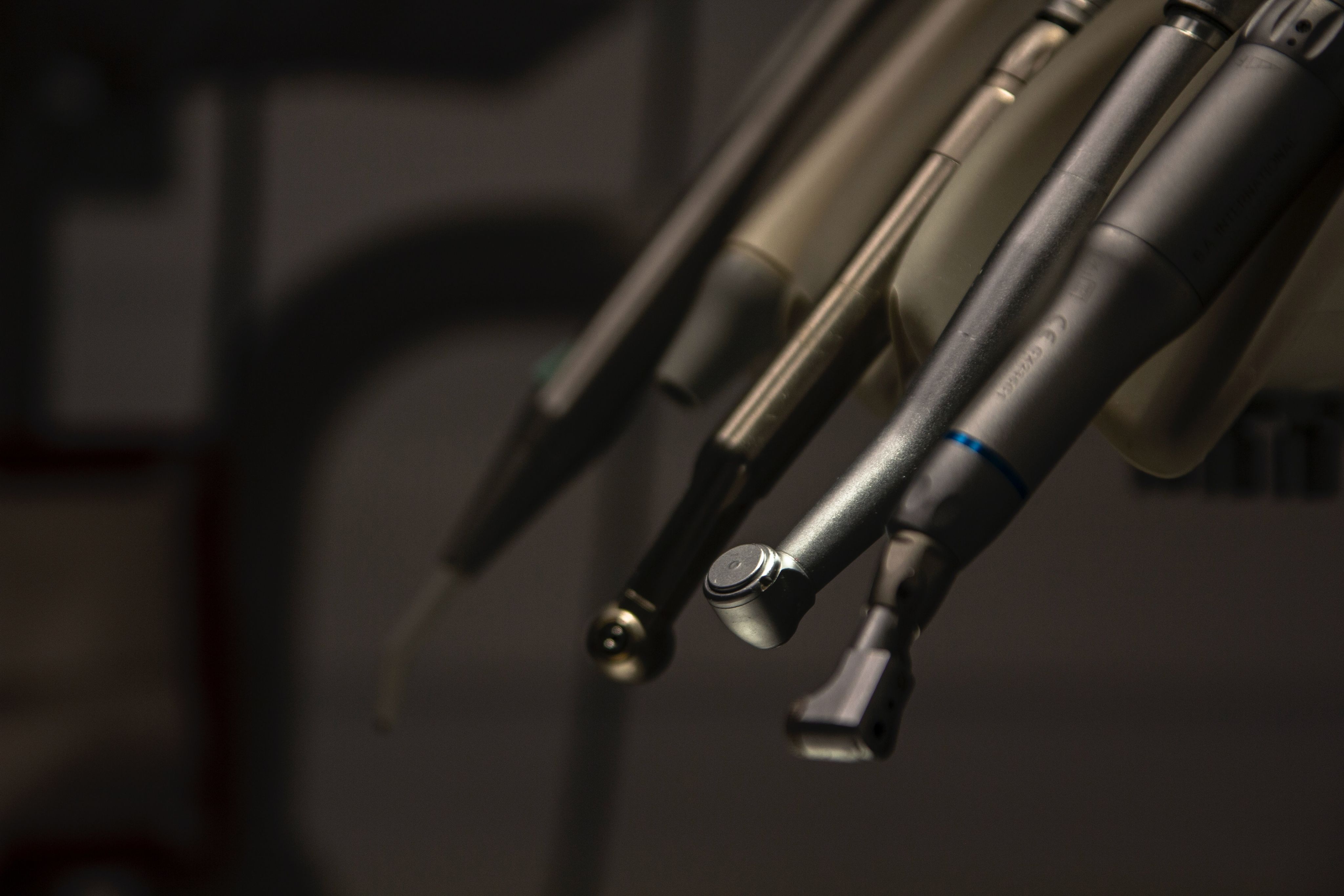The crisis in accessibility to dental care
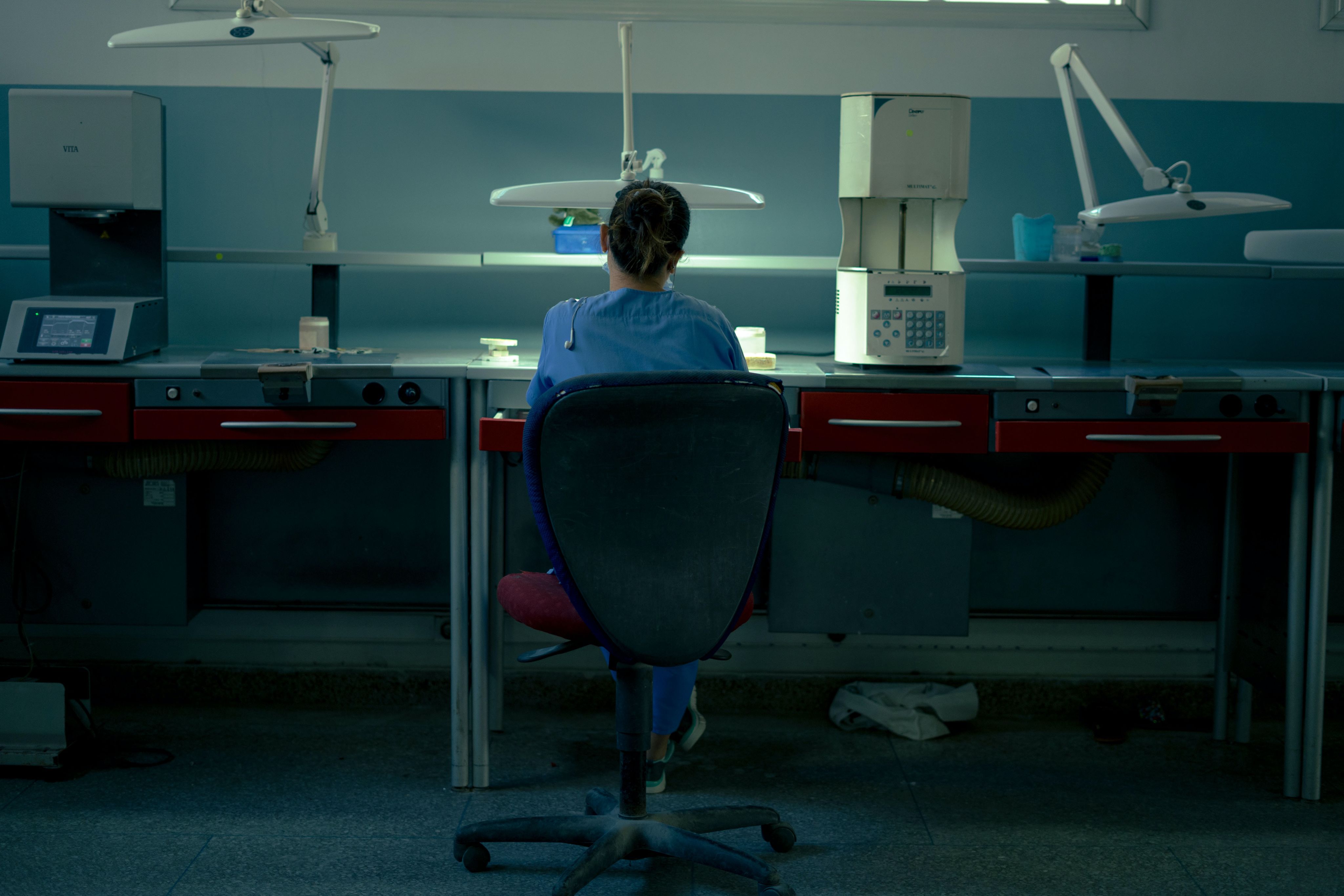
Millions of people in the UK are unable to see dentists due to the backlog in dental care. This backlog is a direct consequence of dentists being forced to close during the Covid-19 pandemic and the return of full services being disrupted by shortages in personal protective equipment (PPE) and the necessity for cleaning to be more thorough between appointments (the fallow time).
The lack of dental practices taking on new NHS patients has led to people resorting to DIY dentistry because of the severe pain they are suffering from.
People suffering from pain so extreme that they were unable to sleep at night visited A&E, only to be turned away after they were told their pain had not reached the required threshold.
The British Dental Association analysed data from a Freedom of Information request in February 2022 which showed 40 million fewer courses of treatment were delivered since March 2020.
The lack of accessibility to oral health care services has left people waiting up to two years to be seen for minor treatment, whilst others have paid for treatment to reduce the waiting time.
However, the ability to pay for private dental care is a luxury most cannot afford.
In addition, the lack of reliable information online about availability at dental practices means people have spent days on the phone ringing practices near where they live, hoping they find one willing to register them and which does not have an excessive waiting list.
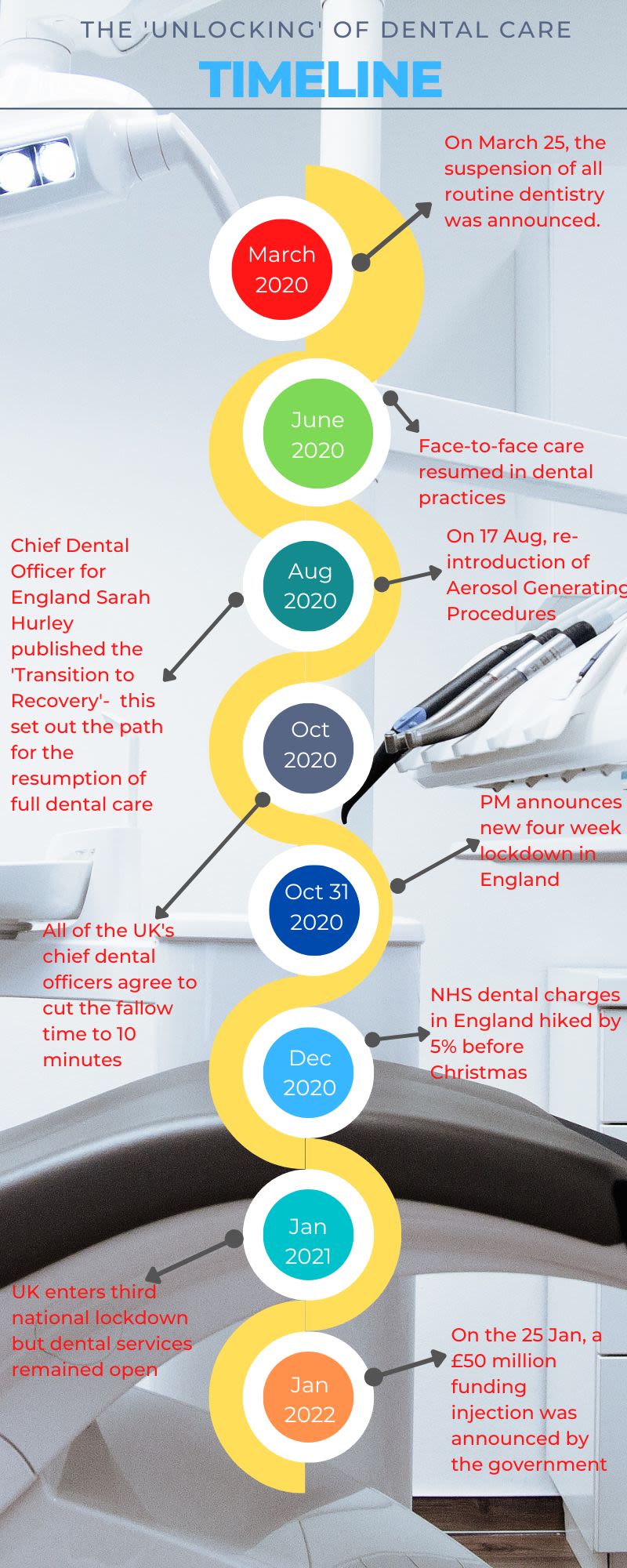
The backlog problem originates from the 25th of March which is when all dentists were required to suspend routine dentistry in response to the start of the pandemic.
Dentists were only allowed to undertake emergency treatment during this period.
“The design and intent behind the cessation of routine dentistry remains the safety of patients and of dentists and their teams.”
Face-to-face care was allowed to resume in June 2020 but dental activity was extremely limited by the shortages in PPE equipment.
Dentists were having to leave at least 30 minutes between appointments, limiting the number of patients they could see in one day.
From the 17th of August onwards, dentists were able to resume Aerosol Generating Procedures (AGPs) again. This meant practices were able to use their high-speed drills and the 3-in-1 (the air and water gun). This development was important in allowing additional treatments to go ahead.
In August 2020, Hurley published a roadmap for dentistry titled ‘Standard Operating Procedure: Transition to Recovery’ and this set out the path back to the resumption of full dental care.
In Wales, the standard operating procedures were adjusted to allow for a minimum of 10 minutes of fallow time before the next patient could be seen. The rest of the UK followed in reducing the minimum fallow time to 10 minutes in October 2020.
In November 2020, NHS dental charges in England were hiked by 5% before Christmas. The hike came into force on the 14th of December 2020.
When the third lockdown came into force in January 2021, dental services were allowed to remain open.
In January this year, the Department of Health announced an extra £50 million of funding would be injected into NHS dentistry.
According to NHS England, this most recent injection of funding “will secure up to 350,000 additional dental appointments allowing people suffering from oral pain, disease, and infection to get the care they need, as services drive back to pre-pandemic levels.”
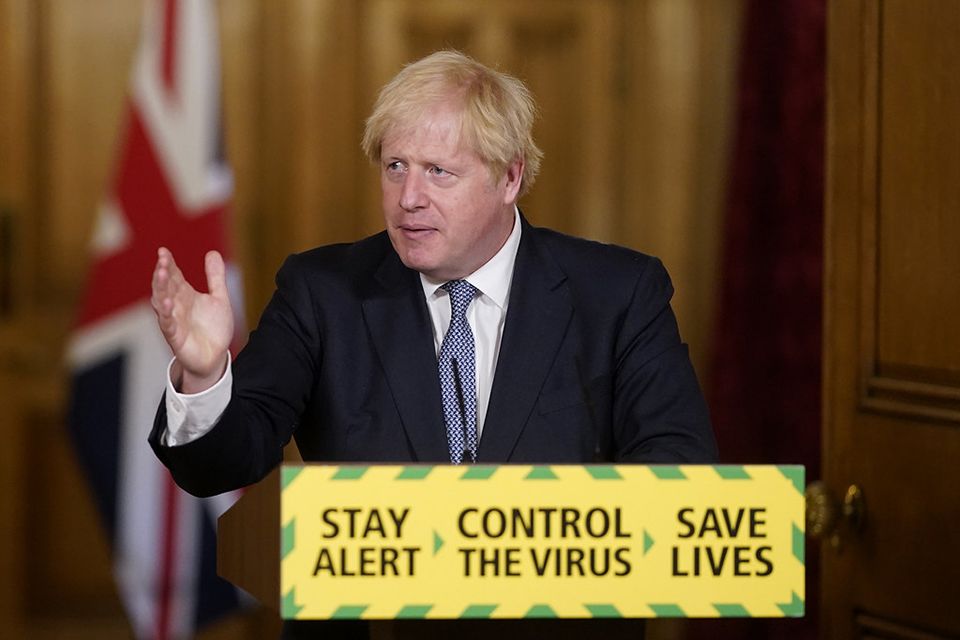


In the 24-month period ending 30 June 2020, just over 21 million adult patients were seen by an NHS dentist, fewer than 50% of the population - NHS Digital

Mike Derry has been the chief officer at Healthwatch Richmond since 2013.
Healthwatch is an independent statutory body and has local branches across the country.
These local branches provide support to people using health and social care services, as well as listening to their experiences.
Mike regularly picks up the phone to people in severe pain who are desperate to find a dentist.
"The biggest problem facing people is the lack of access to NHS dental care and that is certainly the most significant challenge."
Since the pandemic, Mike said he has not seen "any improvements in access," despite dentists resuming full service.
However, Mike has noticed it is now easier to find people dentists outside of Richmond.
Mike said: "One of the things we have become better at is being able to help people find dentists outside of the borough.
"Early on in the pandemic, we were very reliant on finding dentists in Richmond."
A common difficulty people are experiencing is contacting dental practices which have indicated online they are open to seeing new patients , only to be told on the phone they face a two-year wait for an appointment.
Mike said: "We have found dentists have listed their practice as accepting patients and they can't see somebody new for two years."
The lack of dentists taking on new NHS patients is not specifically a London problem but is a recurring issue for people across all parts of the UK.
Mike recalled: "There was one occasion when a person from up by The Wash in Norfolk contacted us because they had exhausted all the dentists within an 80 mile diameter of where they lived.
"They reached out to us and we were successful in identifying a dentist in Southend-on-Sea, which appeared to be their nearest dentist taking on NHS patients."
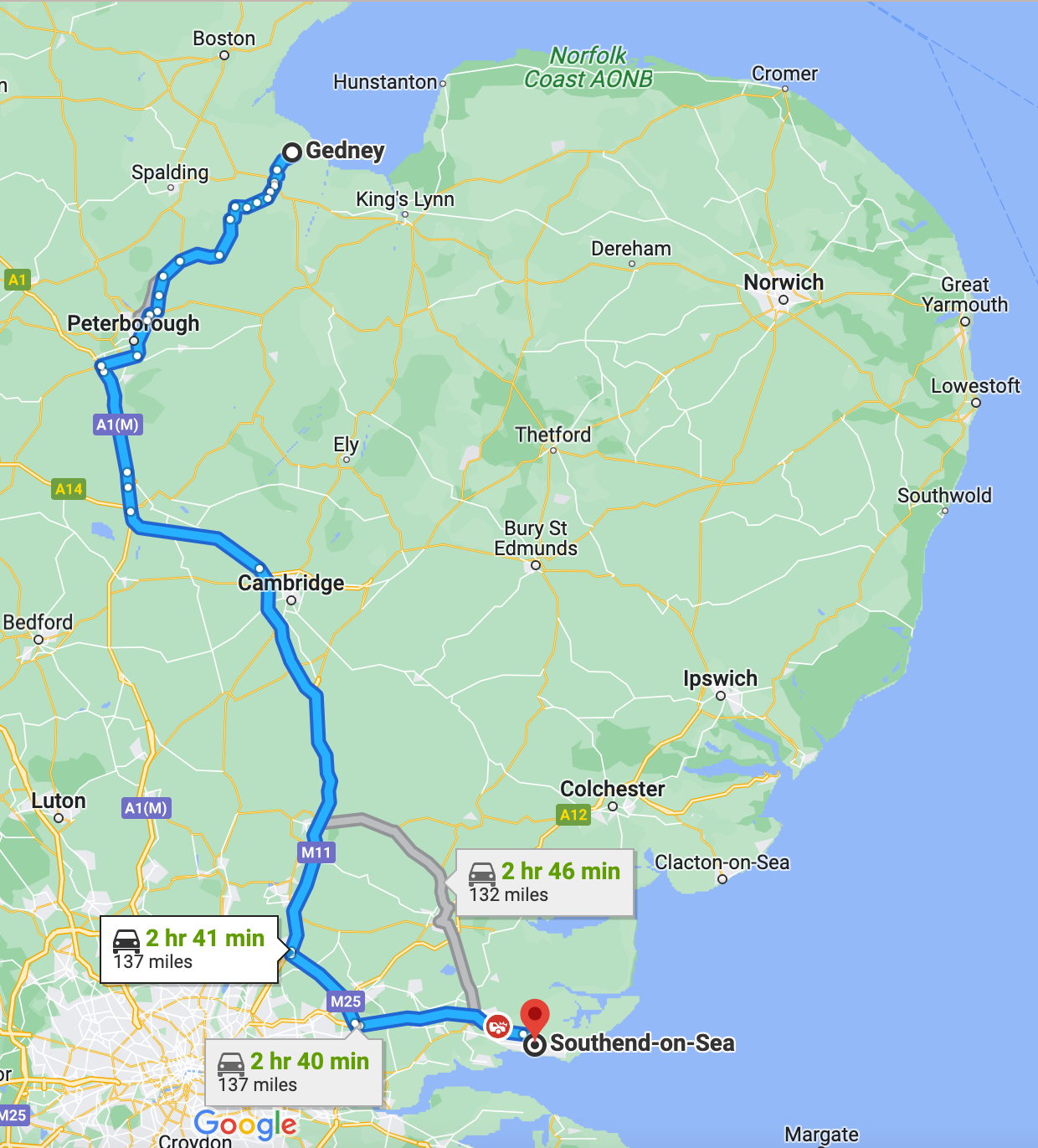
Rough guide for how long it takes to travel from near The Wash to Southend-on-Sea. Source: Google Maps.
Rough guide for how long it takes to travel from near The Wash to Southend-on-Sea. Source: Google Maps.
The waiting time for appointments can be so lengthy that some patients are choosing to be treated privately if they can afford the costs.
Mike revealed there are not only significant backlogs affecting adults requiring NHS dental care but also children.
The British Dental Association has previously warned the government it must address the backlog for child tooth extractions.
Data from the Office for Health Improvement and Disparities show 35,190 extractions were performed on decayed teeth in children aged 0-19 in 2019/20, falling to 14,615 in 2020/21.
Mike has first hand experience of hearing about the impact of this backlog.
Mike said: "There was an instance when an individual's child required emergency dental care on a number of occassions.
"This child had gone for several appointments at emergency dentistry because they couldn’t get an NHS appointment to fix the problem.
"When they finally did manage to get an appointment the dentist said 'I’ll do what I can but they need to go to a dental hospital'."
The waiting list for an appointment at this dental hospital was six months and the family therefore decided to pay privately for dental care.
The cost of the child's treatment was in the region of £1,000.
In May, Charlotte Waite, Chair of the BDA's England Community Dental Services Committee, said: "Tooth extractions among children have collapsed, but the level of demand hasn't gone anywhere.
"COVID has simply left tens of thousands in pain, potentially waiting years for treatment they desperately need."
Charlotte Waite wrote to Matt Hancock, former Health Secretary, in September 2020 and highlighted that over 50,000 children had surgery from all surgical specialities postponed between March and May 2020.
Mike speaks about the likelihood of a drastic reduction in the dental appointment backlogs.
Mike speaks about the likelihood of a drastic reduction in the dental appointment backlogs.
Mike has estimated it will take 120-150% of pre-Covid NHS dental capacity in order to start recovering from a roughly 1.5 year backlog.
Mike said anyone trying to register as an NHS patient at a dentist "may have to call dozens of dentists and we have spoken to people who have spent days on the phone."
In the long term, Mike said the "dental contract has been in need of renewal for some time."
He explained: "What there hasn’t been is any material increase in the number of units of dental activity which have been commissioned.
"The amount dentists are paid for undertaking dental activity hasn't gone up.”
Mike is not optimistic the backlogs will decrease in the near future.
He added: “We need to see more dental capacity being commissioned than we have had previously.
“I wouldn’t anticipate the current plans would create the level of service necessary to address the backlog and make inroads into reducing it.
“I don’t see anything in the government's plans which suggest these new bodies have the tools or levers to pull to address this crisis.”
Twickenham's MP Munira Wilson has previously praised Mike for the important role he played in lobbying the government for greater investment in dentistry.
"I pay tribute to Healthwatch Richmond’s lobbying for bringing us to the point where we have the information to hand and can put pressure on NHS England and on Ministers. I thank Mike Derry for his work. The £50 million for NHS dentistry will offer just 350,000 appointments. Nine million children missed dental appointments in the year following the 1st lockdown."


Only 12 million courses of treatment were carried out by general dentists in the year 2020-21, down 69% compared to the previous year-NHS Digital
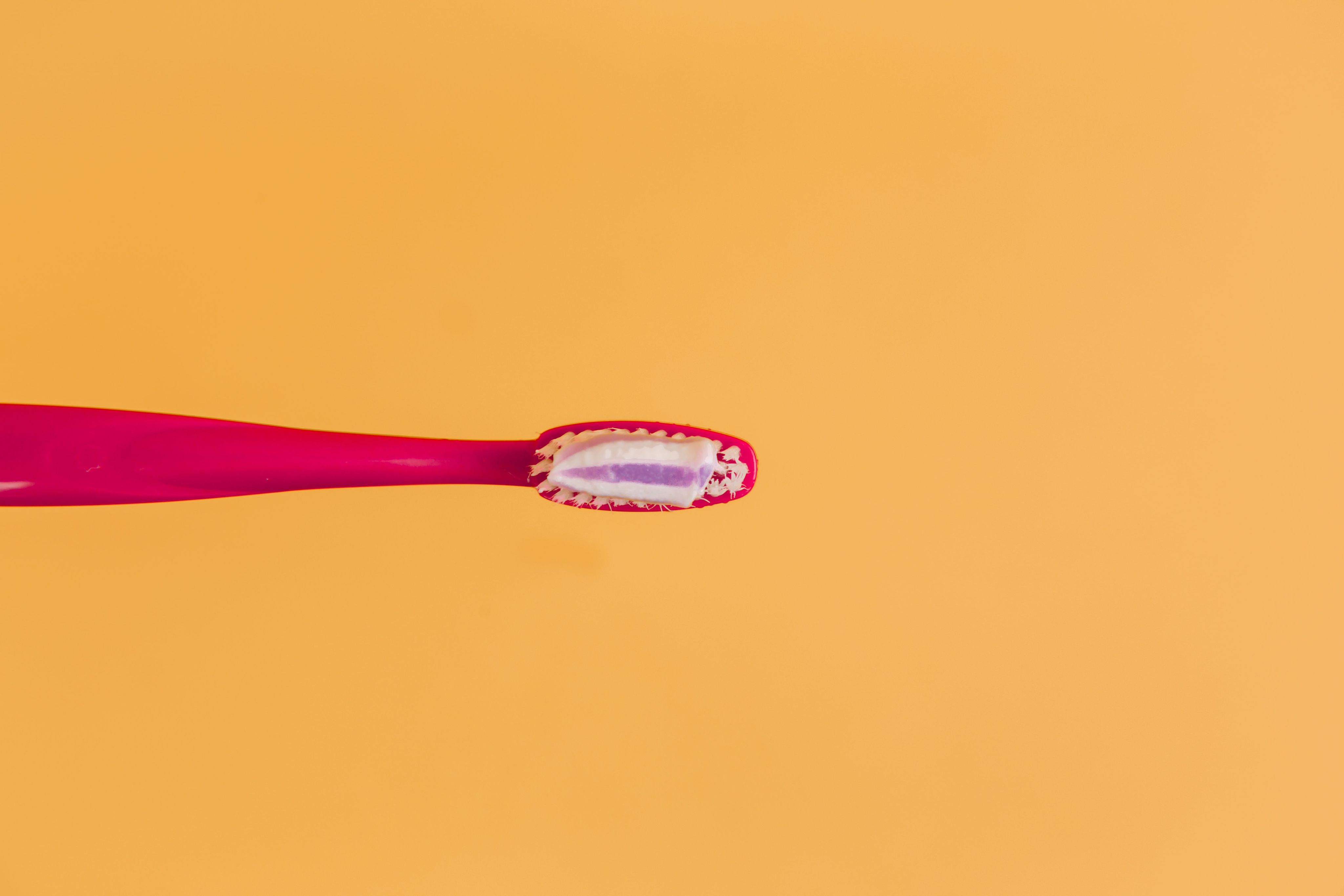
Charlie Notley's story
Charlie, 29, lives in Norfolk and has been searching for a dentist taking on NHS patients since the first lockdown.
Charlie said she rang every single dental practice near where she lived but even the practices which advertised online they were accepting new patients refused to see her.
Charlie said: “After months I gave up until I had the most horrific toothache and realised I had a major issue with my wisdom tooth.”
Charlie then had multiple conversations with 111 and contacted all the recommended dental practices but still found nowhere to treat her toothache.
Charlie said: “After 3 weeks of ringing every day, I finally got seen at an NHS emergency dentist over an hour’s drive away - only to get there and be told ‘we will look but we won’t touch anything until you are registered with a dental practice’.”
At the appointment, Charlie was told her tooth was badly rotten and it was very likely she would get an abscess if she left it any longer without treatment.
However, Charlie left the NHS emergency dentist still in pain and after no treatment.
Charlie was forced to call 111 again and she was advised to attend her local GP surgery, which prescribed her antibiotics.
Charlie described the experience as “really scary” as she could not find any dental practice within a two-hour radius of where she lived which was willing to help.
Charlie eventually resorted to ringing private dental practices and was successful in finding one which was taking on new patients after ringing 12 in total.
“The wait was still three months to be seen,” Charlie said.
Charlie had to pay dental fees in the region of £900 and in total she spent seven months looking for a dentist before she was seen by a private dental practice.
Asked what she would do if problems with her teeth arose in the future, Charlie said: “I would never feel confident trying to find an NHS dentist now, I will definitely only go private from now on.”
The response to the dental care crisis in Westminster
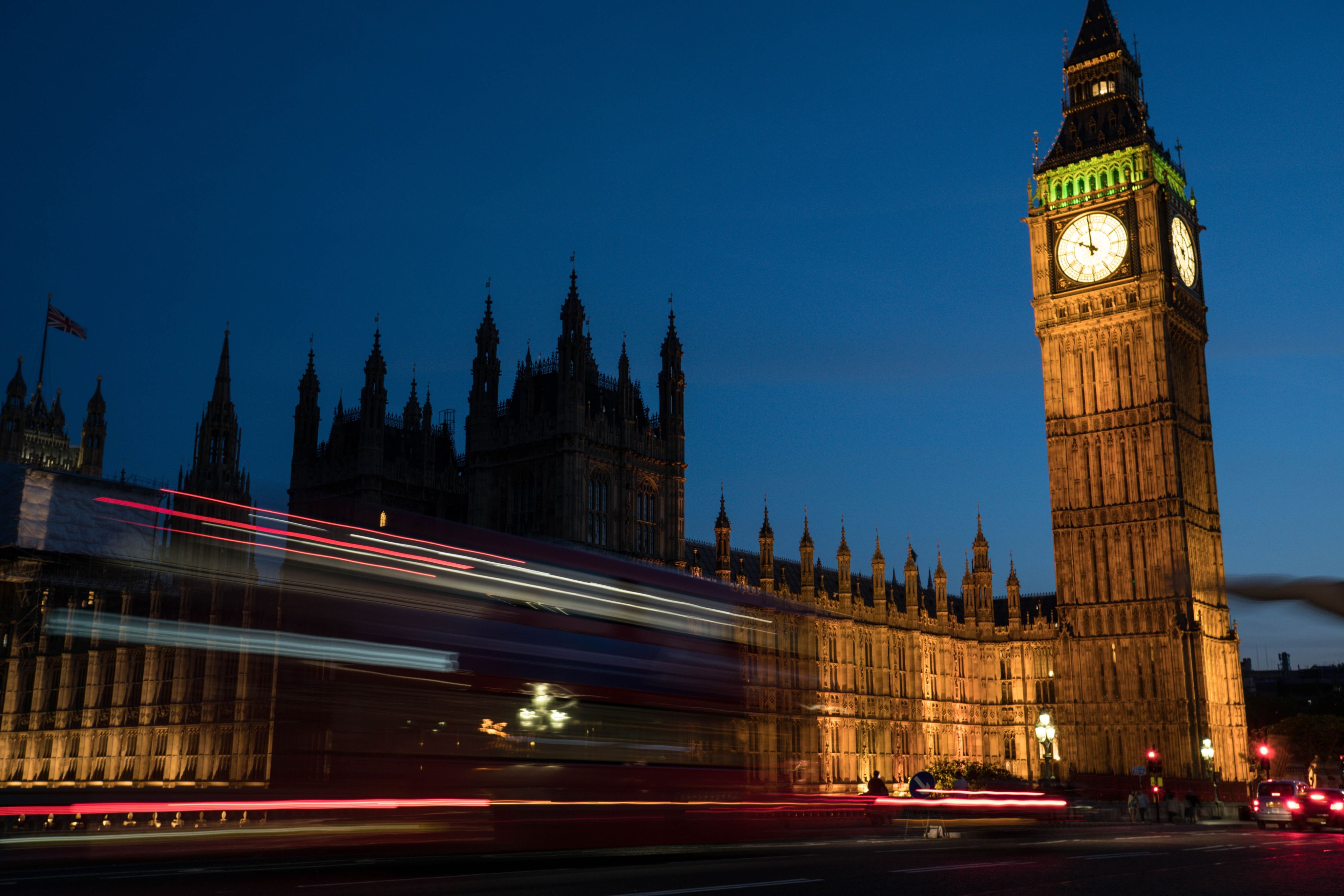
How has the crisis been discussed in the House of Commons?
A debate on the subject of the 'NHS Dentistry Backlog' took place in the House of Commons on Tuesday 19 April 2022.
Maria Caulfield, the Parliamentary Under-Secretary for Health and Social Care clarified the dental activity threshold had risen to 95% of usual activity.
Caulfield said: “I fully recognise, though, that access to NHS dentistry before the pandemic was patchy and that the crux of the problem is the current NHS dental contract, so work is under way to reform that contract."
Ipswich MP Tom Hunt contributed to the debate by touching upon the experiences of his constituents.
He said: “A number of my constituents are finding it impossible to access NHS dental care. They include Alison, one of my constituents who worked as a midwife in Ipswich Hospital for 40 years."
"Some of them have contacted 40 different practices and have not got anywhere. My understanding is that there has been a 30% drop in the number of dentists taking on NHS work in Suffolk.”
Kington Upon Hull West and Hessle's MP, Emma Hardy, also brought up an example from her constituency, where people were being forced to pay for private dental care because of the crisis.
She said: "My constituent contacted me to tell me that when she broke her canine and went to contact her NHS dentist, she found she had been kicked off the list and was facing a bill of £4,000, which she simply does not have, to have the work done privately.”
Enfield North's MP, Feryal Clark, concisely summarised the NHS dentistry crisis when he said: "NHS dentistry is in crisis. Patients are stuck with either a never-ending wait for an NHS appointment or footing the bill for going private, which is simply not an option for most families suffering rising bills and taxes.”
In a more recent debate on NHS dentistry on Thursday 20 October 2022, further notable contributions were made by backbench MPs.
Waveney's MP, Peter Aldous, secured the debate via the Backbench Business Committee.
Speaking in the debate, Aldous said: “In Suffolk, there are 70 dental practices with NHS contracts, but not one is taking on new patients.”
He added: “Since 2008, NHS dentistry has faced cuts with no parallel elsewhere in the NHS, and the British Dental Association states that it will take £880 million per annum to restore the service to 2010 levels."
“Across the country there are a multitude of dental deserts. If we do nothing, if we apply the odd sticking plaster here and there, those will turn into one large Sahara."
The Minister of State at the Department of Health and Social Care, Will Quince, suggested people should be aware they can travel to a neighbouring town or city, if they cannot find a dental practice near where they live.
Quince said: “It is important to get that message out, because when our constituents say to us, “I can’t get a dentist locally”—I want to address that point—I want to ensure that they know that they could travel to a neighbouring town or city.
"They could travel half way across the country if they wanted to, for example if they had relatives there, if there was a NHS dentist who had capacity to see them.”
The latest political development is the Health and Social Care Committee have launched a new inquiry into dentistry.
This inquiry is in response to a BBC survey which showed 90 percent of NHS dental practices in the UK are not accepting new adult NHS patients.
Source: BBC survey. Scatter graph by Ed Halford.
The survey’s findings were included in the BBC Iplayer documentary Disappearing Dentists.
The aim of the inquiry is to find out whether the current NHS dental contract disincentivises dentists from taking on new patients.
Submissions can be made to the inquiry until Wednesday 25 January 2023 and should be no more than 3,000 words.
Mike Derry from Healthwatch Richmond will be contributing to the inquiry.
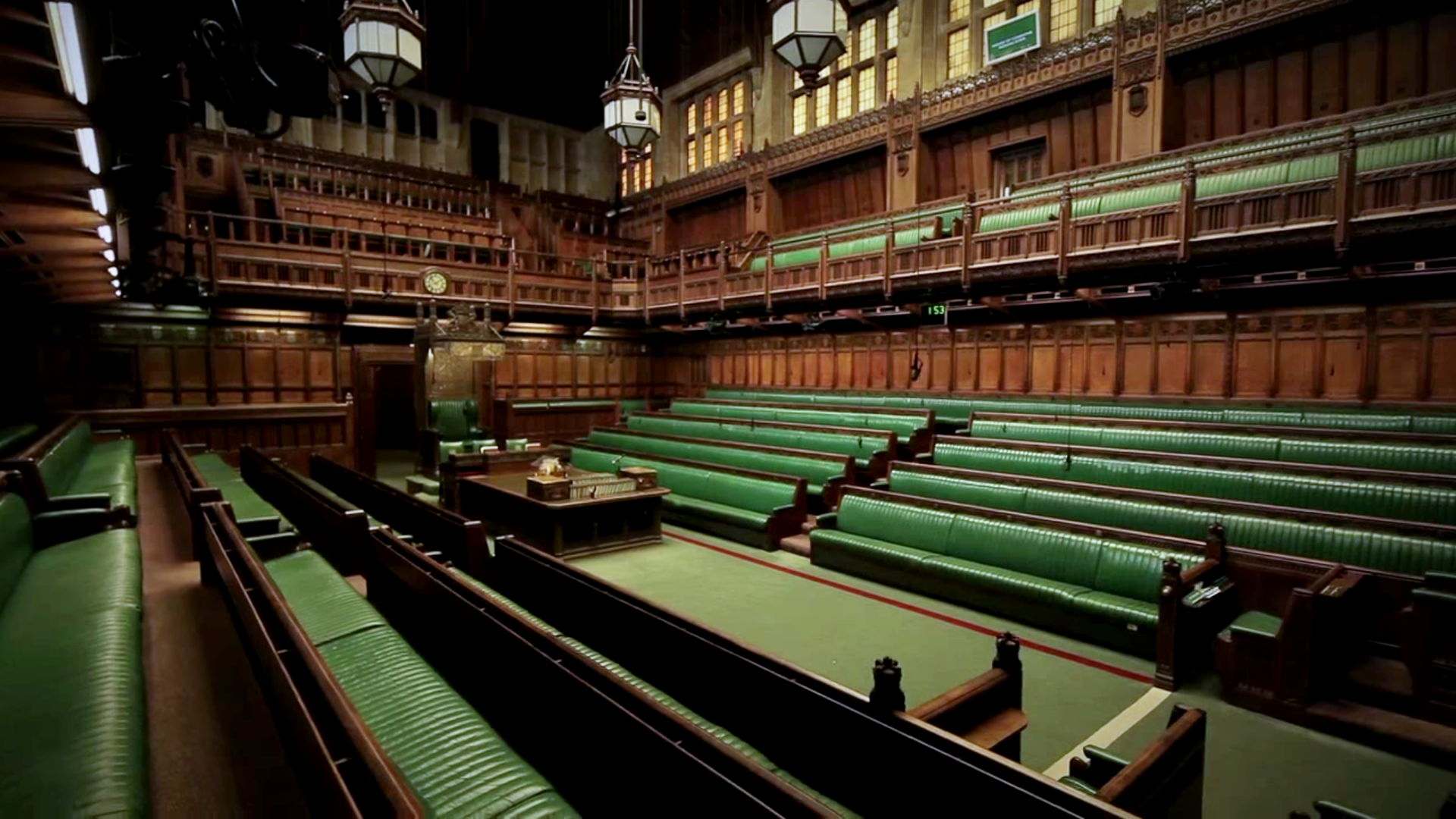

Anna Nowrotek's story
Anna first came to the UK in September 2016 and lives in Norfolk.
Anna has been trying to register at a dental practice as an NHS patient for four years but has found everywhere near where she lives is full.
This became problematic when she started to experience toothache.
Anna said: “During the pandemic, I had a very bad tooth infection but initially the infection was only minor, so I started taking painkillers.
“However, it eventually got to the point where I couldn’t fall asleep, so I asked my neighbours for stronger painkillers.”
The pain became so overwhelming for Anna that she accidentally overdosed on painkillers.
Anna called 111 and they kept checking up on her to ensure she remained fully conscious and didn’t pass out.
Anna did try her luck with a private dental practice but found they were charging an extortionate price just for looking at the infection in her tooth.
Anna said the private dental practice was going to charge her £140 and she therefore decided that her best option was to fly to Poland for treatment.
Anna said she experienced two weeks of agonising pain and had to “get drunk to fall asleep at night.”
Anna travelled to Poland to visit a dentist in Katowice, where she was able to have her tooth rebuilt for around £50.
Anna said she was in constant pain on the flight over to Poland but said in the future she will continue to go there for dental treatment because it is cheaper and more accessible.
She said: “From now on, I’m only flying to Poland to fix my teeth.”
23% of people in the East of England have been unable to afford to see a dentist for a routine check-up in the last year, compared to the national average of 17%-The Great British Oral Health Report
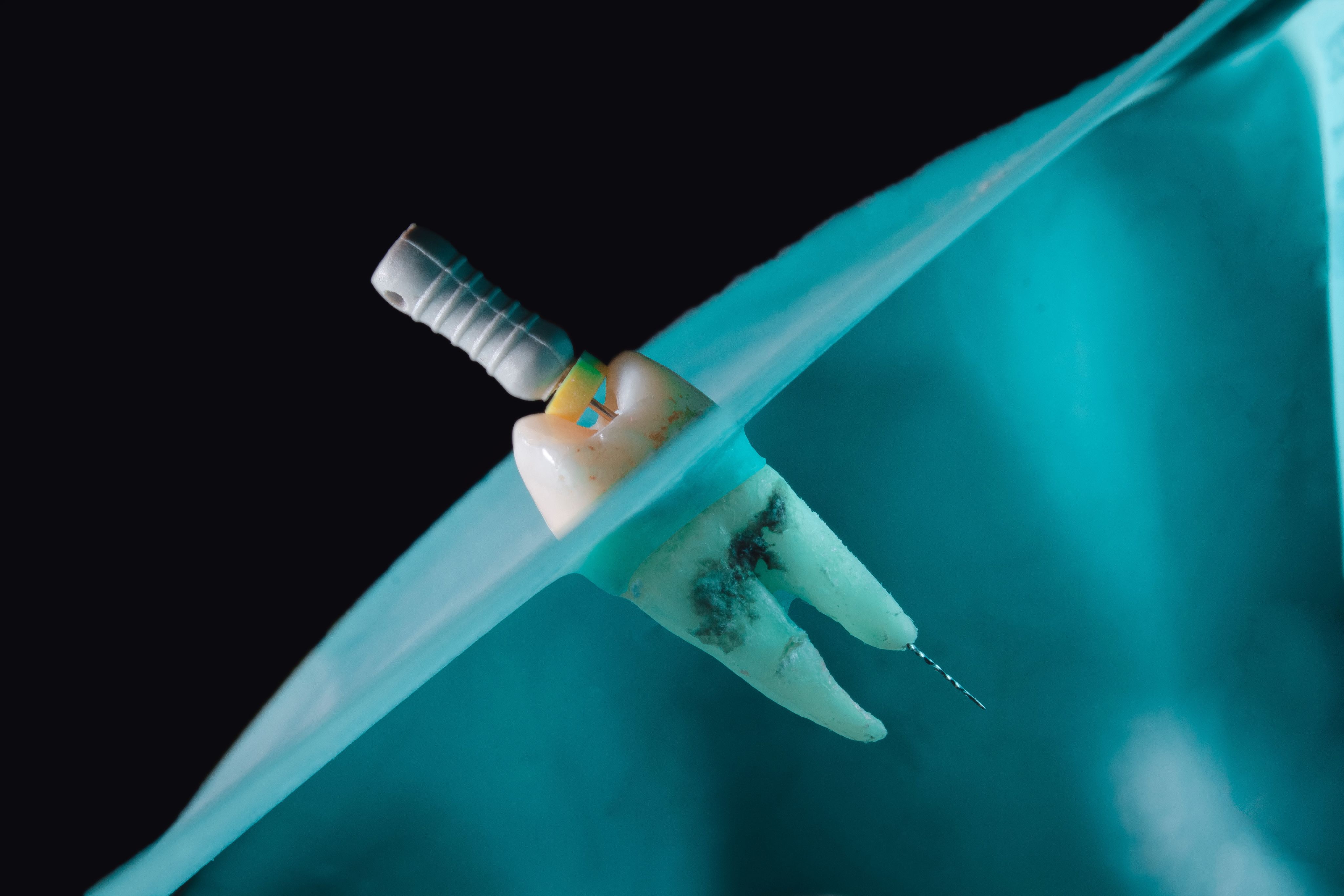
Jacqui Seymour's story
Jacqui Seymour lives outside Norwich and in February 2020 she had a nasty fall on the street.
Jacqui’s front two teeth went straight through her lip, with one falling out completely and the other immediately cracking.
Both quickly became infected.
Jacqui didn’t have a dentist she could go to because her dentist had stopped seeing NHS patients just before the start of the pandemic.
Jacqui’s daughter, Jessica Seymour, agreed to speak about her traumatic experience.
Jessica said those who live around Norwich will normally attend the emergency dentist, the Norwich Dental Access Centre, if they require urgent treatment.
Due to the accident taking place during the pandemic, Jessica said they rang the Norwich Dental Access Centre but were told not to come in.
Jessica said: “Jacqui tried to use the emergency dentist, but she couldn’t get in with them.”
Jacqui was given stitches after the accident, but she still required help because of the pain she was experiencing.
“It was quite a traumatic thing, but the pain didn’t meet their threshold for a traumatic emergency appointment.”
Jacqui’s family helped ring dental practices which said they were accepting new NHS patients online, but Jessica said they spent hours on the phone and were not successful.
Jessica said: “Between us, we must have spent days calling practices, asking if they had any space.
“We kept trying to get back in with the emergency dentist and we never met the threshold.
“My mum was in a lot of pain and she found it very difficult to eat because she had lost her front teeth.”
When Jacqui did manage to find a dental practice, they lost her registration details twice.
This was the third dental practice Jacqui visited since the accident took place.
Jessica said the situation was made worse by the fact it took place during Covid-19 as a “lot of dentists didn’t seem to be in their surgeries.”
Jessica said: “It was quite tricky to know which dental services were taking NHS patients. Even when you get the information it is hard to know if they are at capacity.
“Most places just didn’t get back to you. They all said they were open for emergency treatment and in my mind that should have been an emergency.”
A doctor prescribed Jacqui antibiotics to ease the pain when she was hunting for a dental practice.
Jacqui eventually was accepted by another dental practice, her fourth practice since the accident, after a period of six months but she faces a very long wait until her treatment is complete.
Jacqui cannot drive and this means she has spent considerable money on taxis getting there and back.
Jessica said: “When they first looked at her gums, they realised she had been living with an infection for two- and a-bit years.
“The infection was treated first but the gap between her front two teeth is still very big.
“What she needs to have done is very complex because of the time she had to wait before seeing a dentist."
“After more than two years, my mum still has one missing tooth and a severe crack in the other one which she is severely conscious about.”
Jessica said the long-time Jacqui has waited for her teeth to be treated has taken a very large toll on her mental health.
Jessica speaks about the toll the long wait for treatment has had on Jacqui's mental health.
Jessica speaks about the toll the long wait for treatment has had on Jacqui's mental health.
Jessica said: “She has had several X-rays and they may have to take more of her front teeth out, but she doesn’t want this.”
Jacqui’s dental practice are “trying to build a bridge” to close the gap in her front teeth and after more than two years she is hoping her distressing experience will come to an end soon.
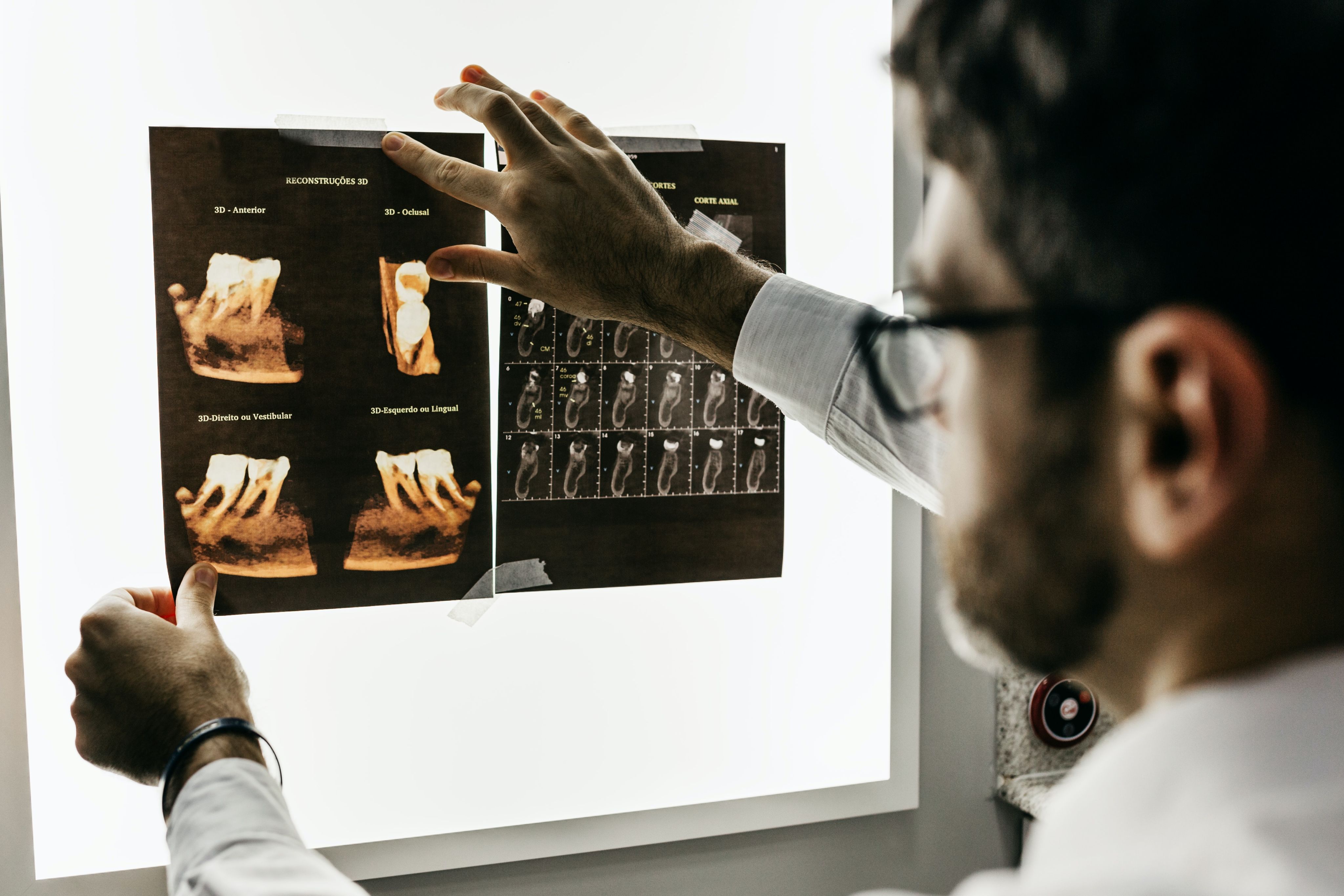
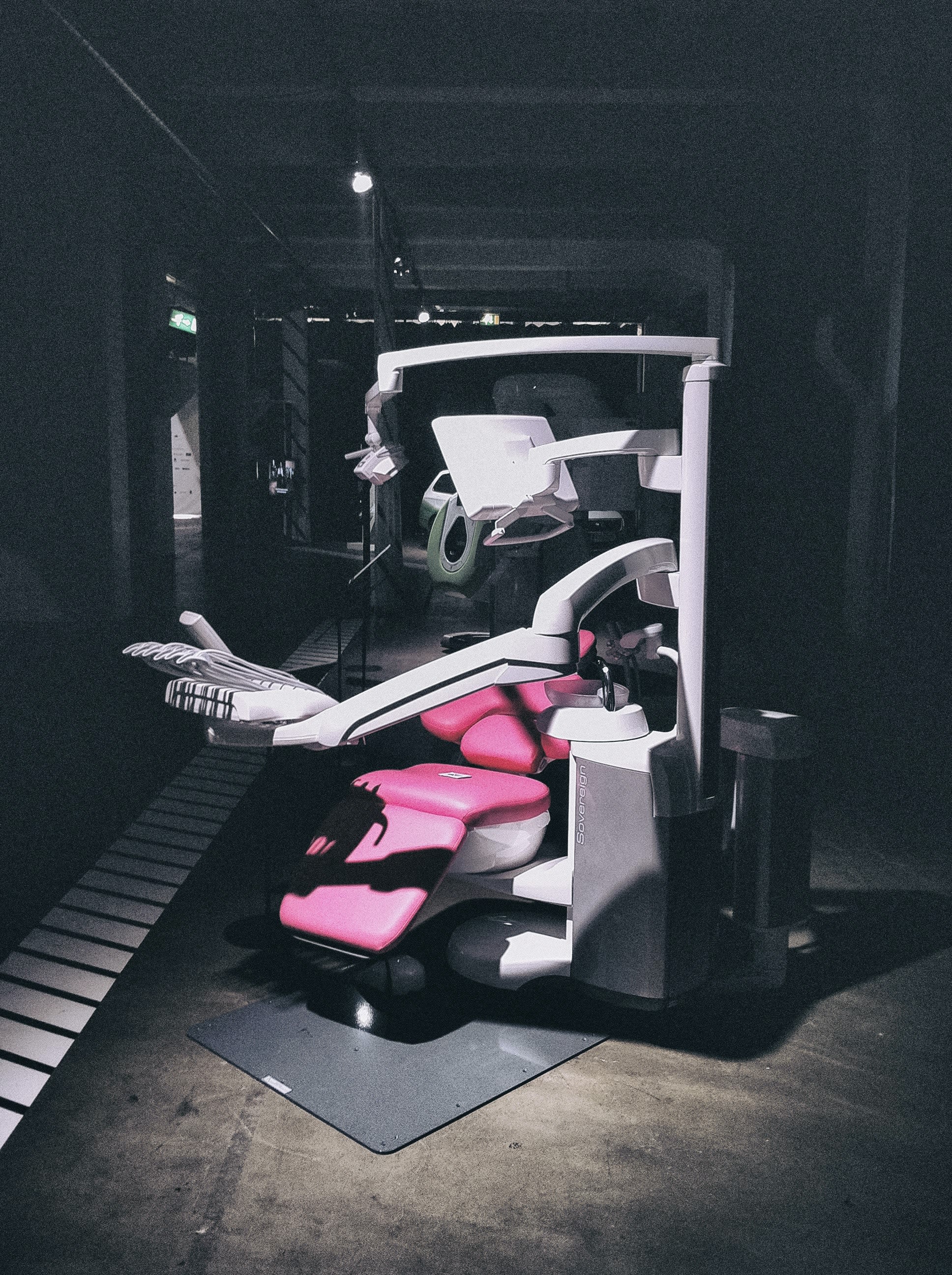
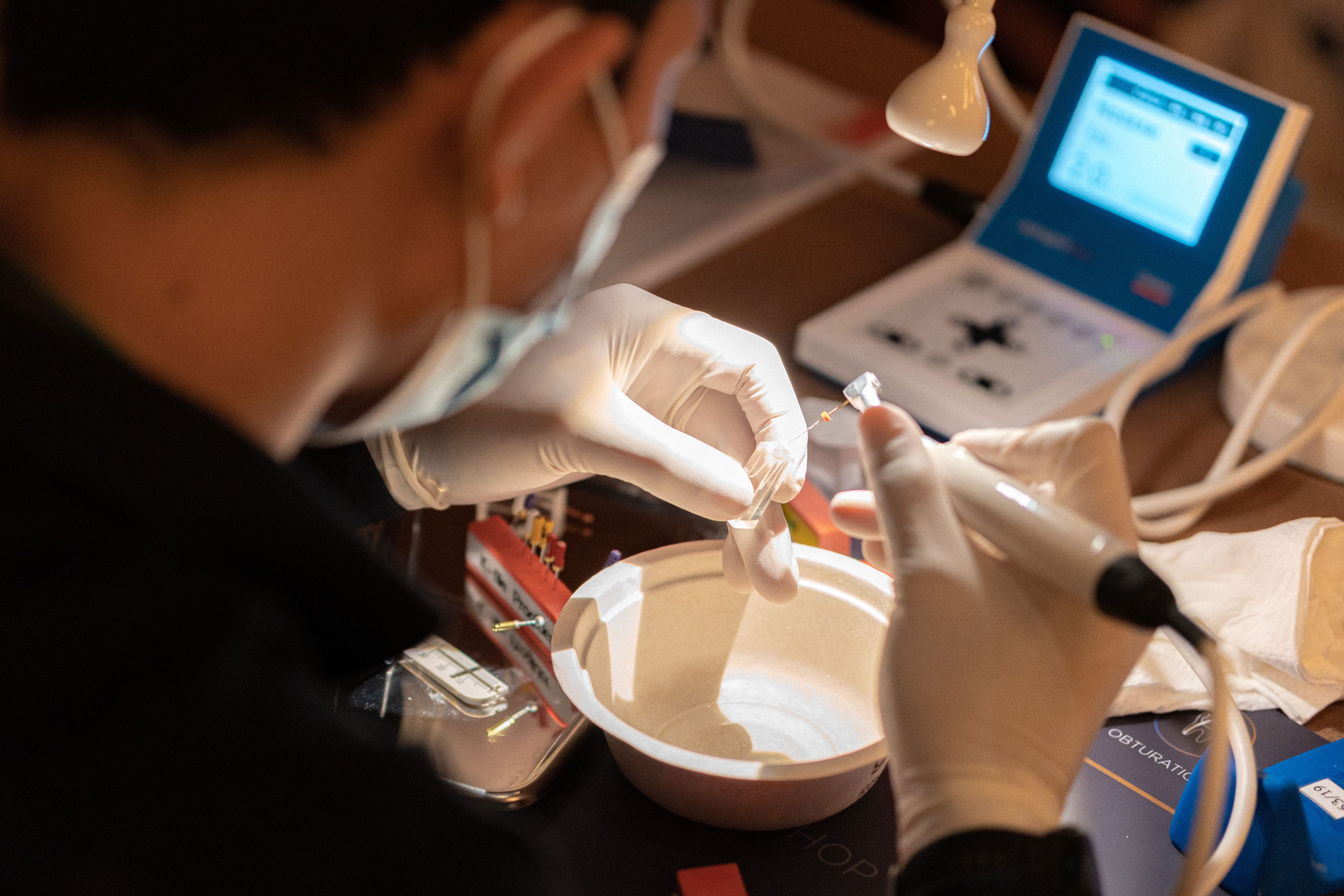
What were the most recent measures introduced to address the backlog in dental care?
In November, the Department of Health and Social Care announced dentists would receive fairer payments for complex treatments.
In the past, dentists received the same payments for all “band two” treatments.
Practices were also told they must regularly update information on the NHS website so people can find accurate information about available services.
Health Minister Neil O’ Brien said: “I am determined to make sure everybody seeking NHS dental care can receive it when they need it.
“Our new contract rewards dentists more fairly for taking on high-needs patients and delivering treatments to those who need it most."
“It will not solve all the problems overnight, but it will help improve access and ensure the system supports dentists and their teams.”
However, these changes were not welcomed by Shawn Charlwood, chair of the BDA’s General Dental Practice Committee.
Charlwood said: “These minor tweaks will not end the access crisis or give demoralised dentists any reason to stay in the NHS.
“It’s one thing to offer a shiny new website showing patients they can’t get an appointment.
“It’s quite another to put in place reform and funding so millions can get the care they need.”
The Health and Social Care Committee also recently launched a new inquiry into NHS dentistry services.
There are no signs the backlog is going to be cleared any time soon, and increasingly wealthier people are opting to pay for private dental care to avoid the long wait for treatment. Accessibility still remains a major problem, and the harsh reality is that many people will continue to visit dental practices far away from their homes if they want to be seen for care quickly. Currently, it is estimated around four million people don’t have access to dental care, and this number is only likely to rise.
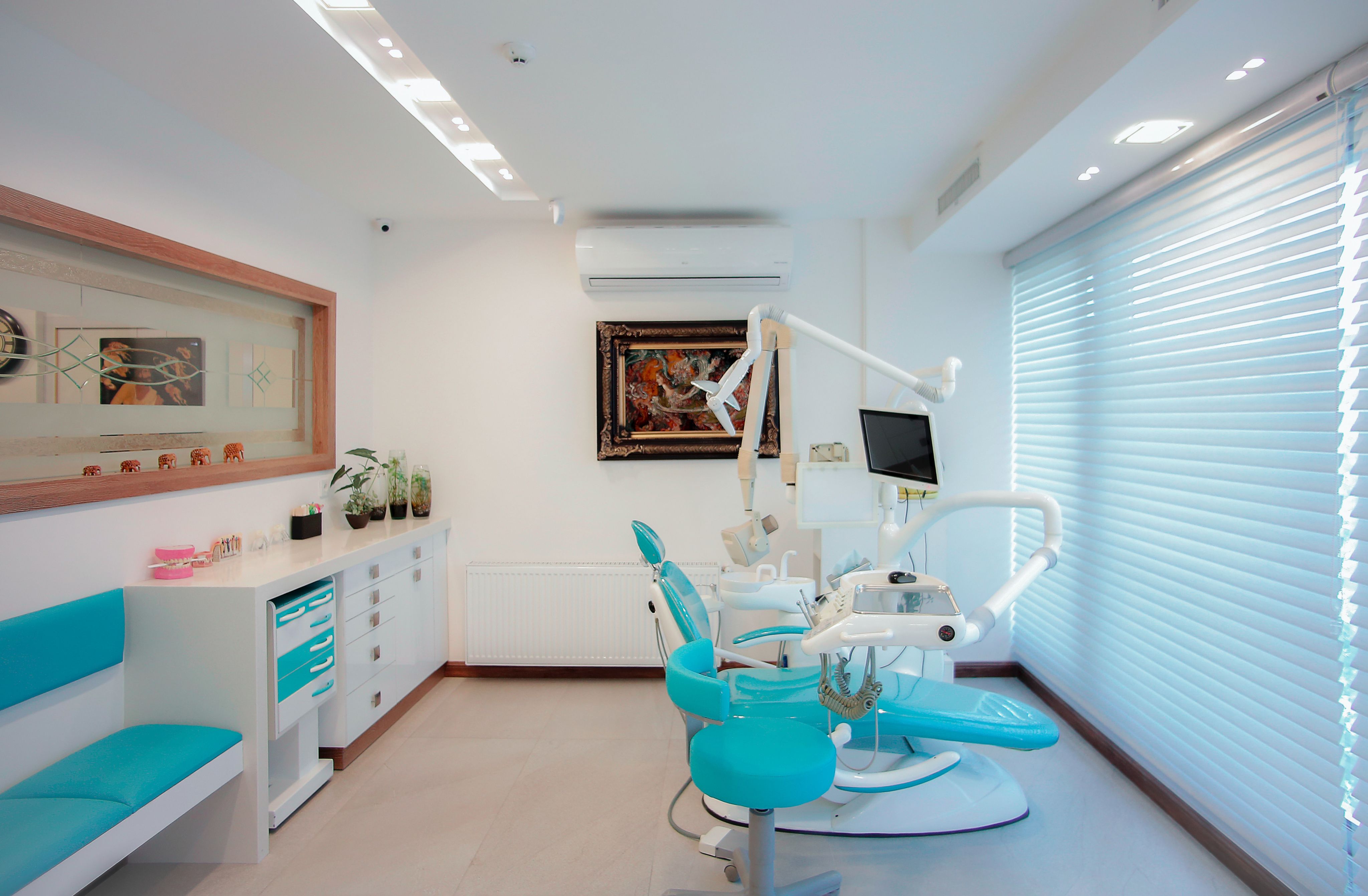


Relevant Twitter accounts to follow for more information about dental care in England





Image credits
Front cover: Photo by Moughit Fawzi on Unsplash
Photo of Covid-19 press conference and Boris Johnson: 10 Downing Street, Open Government Licencev3.0
Photo of Mike Derry: Healthwatch Richmond
House of Commons photo: UK Parliament, Creative Commons
Inside of House of Commons: UK Parliament, Creative Commons
Toothbrush image 1: Photo by Alex Padurariu on Unsplash
Toothbrush image 2: Photo by Diana Polekhina on Unsplash
Charlie Notley selfie: Charlie Notley
Image of outside the Houses of Parliament: Photo by Paul Buffington on Unsplash
Anna Nowrotek selfie: Anna Nowrotek
Image of tooth in water: Photo by Ozkan Guner on Unsplash
Image of man with X-ray: Photo by Jonathan Borba on Unsplash
Image of operating theatre: Photo by Hans Eiskonen on Unsplash
Image of dental technician: Photo by Hans Eiskonen on Unsplash
Image of dental surgery room: Photo by Benyamin Bohlouli on Unsplash
Image of tooth brushes: Photo by Bekky Bekks on Unsplash
Image credit cover photo: Photo by Ozkan Guner on Unsplash
